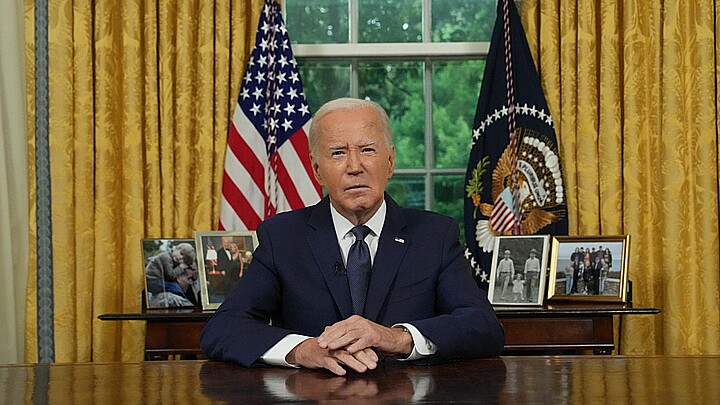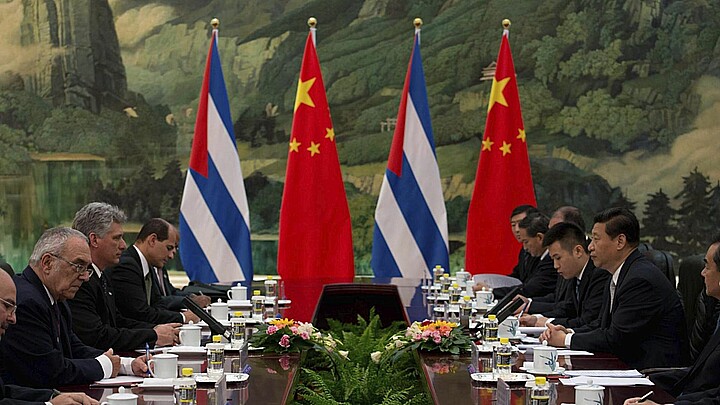Politics
Cuba sends doctors to Mexico as part of its indentured servitude program of medical professionals
Apparently, the reason for the visit is to personally thank Díaz-Canel for sending almost 600 Cuban doctors, hired by the communist regime to work in Mexico
February 8, 2023 5:05pm
Updated: February 10, 2023 9:12am
Cuban dictator Miguel Díaz-Canel will meet with Mexican President Andrés Manuel López Obrador on Saturday, Feb. 11 in the city of Campeche, capital of the homonymous state located in the southeast of the country.
The Office of the Mexican Presidency reported that the reception will take place at 8:00 a.m. local time, and it will be the fourth time Díaz-Canel, the president appointed by General Raúl Castro for his succession to power, will visit Mexico.
The purported reason for the trip is so López Obrador can thank Díaz-Canel for sending almost 600 Cuban doctors to work in Mexican Social Security Institute (IMSS) hospitals, which are located in remote areas of the country, EFE news agency reported.
The arrival of Cuban doctors in Mexico occurred after the Institute of Health for Well-Being announced a 2022 deficit of doctors specializing in internal medicine, gynecology and obstetrics, pediatrics, dermatology and anesthesiology in rural and remote areas.
To combat the problem, López Obrador launched a National Day for the Recruitment and Hiring of Specialist Doctors in hopes of remedying more than 14,000 vacancies.
Still, there was an alleged lack of interest from national professionals, prompting the Mexican government to ask the Cuban regime to lease its doctors to fill the vacancies, according to reports.
Since then, 553 Cubans have arrived in Mexico to work in 12 states of the country: 300 men and 253 women, according to official sources cited by Infobae.
The government has not identified the doctor's names and salaries, arguing that it is confidential data, a move that irked the National Transparency Institute, which has petitioned for a breakdown of the names, sex, age and specialty of each of the Cuban doctors.
Mexico's National Action Party (PAN) criticized the call, pointing out that these positions should be assigned to professionals in the country, while also complaining that the Cuban doctors are receiving a salary higher than that of a Mexican.
In the past, several NGOs have reported that while the Cuban regime leases its general practitioner doctors in indentured servitude to other countries, it withholds specialists to prevent their defection.
Human rights organization Prisoners Defenders has reported that if the doctors try to defect or escape while working abroad they will be charged criminally under the Cuban Penal Code. Under Article 176, the doctors can face up to eight years in prison or from reentering the island for the crime of 'desertion' since Cuban law impugns "duties" to citizens.
This recent agreement and others with European countries were denounced by various Mexican legislators.
Politicians complaining about the human rights component pointed to multiple reports from organizations such as Human Rights Watch (HRW), the Human Rights Foundation (HRF) and various resolutions of the European Parliament, which "have denounced the violation of human rights and the work of doctors in the context of similar contracts.”
These institutions classify the "missions" or Cuban medical brigades as a scheme of labor exploitation and human trafficking.
Historically, relations between Cuba and Mexico have been amicable, but since López Obrador came to power in 2018 there has been a closer rapprochement with the oldest dictatorship in the hemisphere.
The alliance has been illuminated by numerous politicians from that country and abroad, particularly U.S. Congresswoman María Elvira Salazar.
Salazar, who is of Cuban origin, lashed out last December against López Obrador for publicly acknowledging his admiration for the late Cuban dictator Fidel Castro and the communist guerrilla Ernesto "Che" Guevara.
"They [Castro and Guevara] massacred the people of Cuba and terrorized the people of America. It is nothing worth celebrating," replied Salazar in a tweet in which he published a fragment of the video where López Obrador declared himself an "idealist" and an admirer of the "men who exercise the power".










